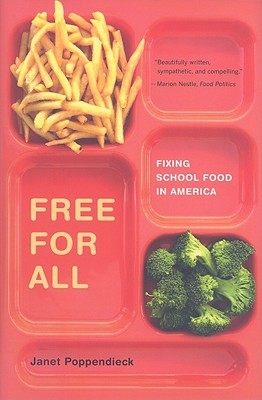Free For All: Fixing School Food in America, by Janet Poppendieck
May 3
2010

Janet Poppendieck writes like a lawyer, and we mean that in the best possible way. She's careful and she covers her bases—both highly desirable traits in a nonfiction writer, particularly when one is exploring a subject as large and complex as the problems facing our school food system.
Poppendieck's Free For All: Fixing School Food in America takes readers on a journey through America's public school kitchens, attempting to paint a comprehensive picture of school food programs across the country. Her initial focus was on the National School Lunch Program and the School Breakfast Program, the USDA-administered programs responsible for subsidizing a jaw-dropping 7 billion meals per year. However, she soon discovered that much of the food bought at schools has nothing to do with these programs. “Competitive foods” sold in school stores, a la carte lines, food courts, and vending machines are largely unregulated by the federal government. They are also generally more profitable for schools to sell and less healthy for students to eat.
Free For All approaches school food from a variety of perspectives (financial, historical, health-related) and investigates everything from federal nutrition standards to the more than 12.4 million children under age 18 who live in homes with “very low food security” (as of Nov. 2008). The picture Poppendieck paints—of terrible food, unhealthy kids, and schools forced to choose between financial losses and fatty, salty, sugary vending machine sales—is both impressively detailed and crazy depressing. We found her research absolutely fascinating, but it's tough to bounce back from the news that the country's most popular school lunch is a small pepperoni pizza, nachos, a peanut butter cookie, and a diet soda.
When First Lady Michelle Obama announced she would be tackling America's public school food as part of her focus on childhood obesity, she was widely praised for making a safely apolitical choice... but now that we've read Poppendieck's book, we're wondering if Obama might have better luck declaring war on the weather. The scope of this problem is staggering, and while Poppendieck has spoken in interviews about her belief that we can achieve healthy, appealing meals for America's school children, the grim picture she oh-so-thoroughly paints in Free For All doesn't inspire much optimism.
Review based on publisher-provided copy.
Poppendieck's Free For All: Fixing School Food in America takes readers on a journey through America's public school kitchens, attempting to paint a comprehensive picture of school food programs across the country. Her initial focus was on the National School Lunch Program and the School Breakfast Program, the USDA-administered programs responsible for subsidizing a jaw-dropping 7 billion meals per year. However, she soon discovered that much of the food bought at schools has nothing to do with these programs. “Competitive foods” sold in school stores, a la carte lines, food courts, and vending machines are largely unregulated by the federal government. They are also generally more profitable for schools to sell and less healthy for students to eat.
Free For All approaches school food from a variety of perspectives (financial, historical, health-related) and investigates everything from federal nutrition standards to the more than 12.4 million children under age 18 who live in homes with “very low food security” (as of Nov. 2008). The picture Poppendieck paints—of terrible food, unhealthy kids, and schools forced to choose between financial losses and fatty, salty, sugary vending machine sales—is both impressively detailed and crazy depressing. We found her research absolutely fascinating, but it's tough to bounce back from the news that the country's most popular school lunch is a small pepperoni pizza, nachos, a peanut butter cookie, and a diet soda.
When First Lady Michelle Obama announced she would be tackling America's public school food as part of her focus on childhood obesity, she was widely praised for making a safely apolitical choice... but now that we've read Poppendieck's book, we're wondering if Obama might have better luck declaring war on the weather. The scope of this problem is staggering, and while Poppendieck has spoken in interviews about her belief that we can achieve healthy, appealing meals for America's school children, the grim picture she oh-so-thoroughly paints in Free For All doesn't inspire much optimism.
Review based on publisher-provided copy.
Posted by: Julia, Last edit by: Julianka
No new comments are allowed on this post.
Comments
No comments yet. Be the first!